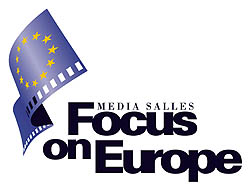
Milan, 28 June 2005
“Will Digital be the
Savior of European Film?”
A seminar opens Focus on Europe at Cinema Expo International
Quality first. This is the imperative
repeated by many different voices yesterday, during the seminar that
opened the MEDIA Salles’ “Focus on Europe” event in
Amsterdam. And if no-one seems ready to entrust digital with the task
of saving Europe’s cinema, there are many ready to believe that
the new technology can offer more than one chance to films from the
Old Continent, if properly used.
As in the case reported by Florent Bugeau, Head of Distribution
of Rézo Films (France), of the Ingmar Bergman film,
Saraband. When the director refused to transfer his work onto film,
judging it to be of lower quality than high definition, the people at
Rézo found a way of seeing that the film literally crossed France.
And thus the collaboration with Barco France was launched. In fact Barco
provided the cinemas that were interested with a digital projector and
server and Rézo Films organised the distribution, not only of
the film: on a truck, together with the latter, the equipment travelled,
too. ”The challenge we decided to take up by gambling on digital
– comments Bugeau – is that of Bergman versus Lucas, or
independent cinema against the Hollywood giants, for the sake of diversity”.
Cultural diversity and attention to the demands of local identity –
a peculiarity of independent cinema – are the decisive factors
emphasised by Nico Simon, Chief Executive Officer of Utopia,
an exhibition chain with as many as 10 screens equipped for digital
projection. And it is not by chance that in 2004, amongst the 5 European
films screened by Utopia, which has cinemas in Luxembourg, Belgium,
The Netherlands and France, 3 of them (K3 en de Magische Medaillon,
Pluk en de Petteflet, Heim ins Reich) had a strong local focus.
Moreover, Heim ins Reich, a documentary on the German occupation of
Luxembourg, filmed on Betacam, is a significant case: it reached cinemas
thanks to digital screening and, surprisingly, was one of the 10 most
widely seen films in Luxembourg in 2004.
Another key factor in Simon’s opinion is quality, including that
of the screening: “we have to go for the best possible technology.
With 2K, for example, digital equals, and in some respects even betters
35mm”.
“What counts – confirmed Joachim Ph. Wolff,
Scientific advisor to MEDIA Salles’ "European Cinema Yearbook"
and Chairman of The Netherlands Foundation for Film Research –
is the quality of production”, which, in Wolff’s view, is
far more important than the distribution format. Nonetheless, some figures
he showed also open up the way for other reflections: as in the case
of the Danish film Italian for Beginners, of which only 89 copies were
distributed in Germany in 2002, drawing as many as 860,000 admissions,
i.e. more than films that could rely on at least three times as many
copies. Thus better planning of distribution, perhaps with a few extra
copies once the audience reaction has been observed – something
that digital technology would make far easier –, might well have
been able to increase the number of tickets sold.
As stressed by the MEDIA Salles’ Secretary General, Elisabetta
Brunella, who chaired the seminar, it is a question of “coordinating
digital screening and the planning of strategic choices, the only way
of making the adoption of a certain technology into a winning choice”.
Strategic choices that must be capable of a long-term view: “digital
technology – commented David Gadja, Vice President
of Access IT, a US company providing services for cinemas – if
they are well used, can help European films to be seen more not only
in Europe but throughout the world, thanks also to the linguistic affinities
with large geographical areas and the possibility of using the new technology
not only for distribution but also for improving promotion and, therefore,
the circulation of the works”.
MEDIA Salles’ Focus
on Europe continues this evening with the “A Salute to European
Film” (Westhal 3, 8.30 pm), during which the “International
Directors of the Year” Award will be presented to Jean-Pierre
and Luc Dardenne and the new initiative “Italian Cinema Worldwide”
will be launched.
Cinema
Expo International is the traditional meeting for European
exhibitors, which brings together over 1,200 professional operators
from all countries. The event includes seminars on different aspects
of the cinema industry and the presentation of films about to be released.
The programme of Cinema Expo International includes an exhibition of
equipment and services for cinemas, from theatre design to the most
technologically advanced products.
The MEDIA Salles project
operates within the framework of the European Union's MEDIA
Programme, with the support of the Italian Government.
The end objective of MEDIA Salles is to foster theatrical distribution
of European audiovisual products. This aim is pursued both by high profile
campaigns involving Europe's cinema exhibitors and by initiatives to
raise the visibility of European productions with industry players and
potential audiences, creating specialized information channels on a
global scale. Thus the current initiatives from MEDIA Salles dovetail
in a program with a triple focus - training, promotion and information
- and maximum combined effect.
MEDIA Salles
Via Soperga, 2 – I-20127 Milan
Tel.: +39.02.66984405 – Fax: +39.02.6691574
E-mail: infocinema@mediasalles.it

